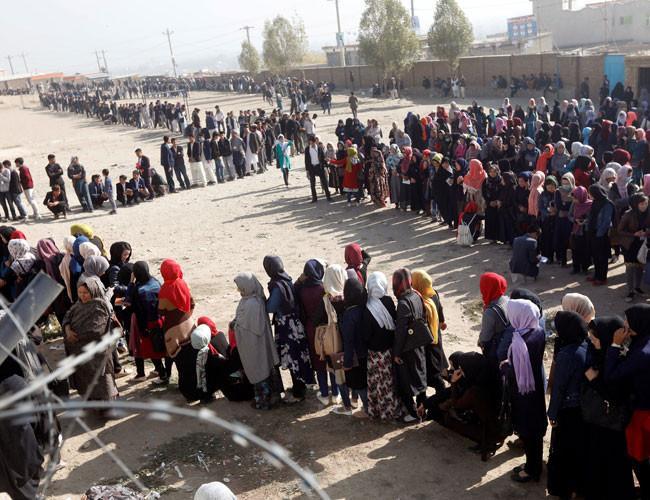
Nearly 170 Afghans were killed or wounded in poll-related violence on Oct. 20, official figures showed, as the legislative election turned chaotic with many polling centers opening hours late - or not at all - due to technical glitches and lack of staff.
In the latest attack, a suicide bomber blew himself up inside a Kabul polling center, killing at least 15 people and wounding 20, police said, taking the number of casualties across the Afghan capital to 19 dead and nearly 100 wounded.
There was no immediate claim of responsibility for the blast, but the Taliban said earlier it had carried out more than 300 attacks on the “fake election” across the war-torn country.
Violence also disrupted voting in the northern city of Kunduz where a senior health official told AFP three people died and 39 were wounded after more than 20 rockets rained down on the provincial capital.
An Independent Election Commission (IEC) employee was killed and seven others were missing after the Taliban attacked a polling center several kilometers from Kunduz city, destroying ballot boxes, provincial IEC director Mohammad Rasoul Omar said.
Eight explosions were recorded in the eastern province of Nangarhar, with two people killed and five wounded, the provincial governor’s spokesman said.
The interior ministry put the overall casualty toll -- including civilians and security forces - slightly lower at 160, with 27 civilians killed and 100 wounded.
There were 193 attacks across the country, which the ministry said was half the number recorded on the day of the 2014 presidential election.
Initial figures showed at least 1.5 million voters turned up at polling centers in 27 provinces, election organizers said - a fraction of the nearly nine million voter registrations. Many voters waited hours for the doors to open.
Most polling sites opened late after teachers employed to handle the voting process failed to show up on time, said the IEC.
The election commission, which has been skewered over its shambolic preparations for the long-delayed ballot, said they would extend voting until Oct. 21 for 371 polling centers after hiccups with voter registration lists, biometric verification devices and staffing.
The parliamentary election is more than three years late and only the third since the fall of the Taliban in 2001.
Turnout was likely affected after the Taliban issued several warnings in the days leading up to the poll calling on candidates to withdraw from the race and for voters to stay home.
Hundreds of people were killed or wounded in the months before the poll.
The killing of a powerful police chief in the southern province of Kandahar on Oct. 18 further eroded confidence in the ability of security forces to protect voters.
Voting in Kandahar has been delayed by a week following the attack.
Despite the risks, President Ashraf Ghani urged “every Afghan, young and old, women and men” to exercise their right to vote, after casting his ballot in Kabul.
Photos posted on social media showed scores of men and women clutching their identification documents lining up outside voting centers amid a heavy security presence. A woman dressed in a burqa leaving a polling center in Mazar-i-Sharif told AFP she had been worried about “security incidents”, but decided to vote anyway.
“We have to defy the violence,” Hafiza, 57, said.
At least 10 candidates out of more than 2,500 contesting the lower-house election were killed ahead of the poll.
Most of those standing are political novices, and include doctors, mullahs and journalists. Those with the deepest pockets are expected to win.
The poll is seen as a crucial test for next year’s presidential election and an important milestone ahead of a U.N. meeting in Geneva in November where Afghanistan is under pressure to show progress on “democratic processes.”
Preliminary results are scheduled to be released on November 10 but there are concerns they could be thrown into turmoil if the biometric verification devices are broken, lost or destroyed.
Votes cast without the controversial machines will not be counted, the IEC has said.